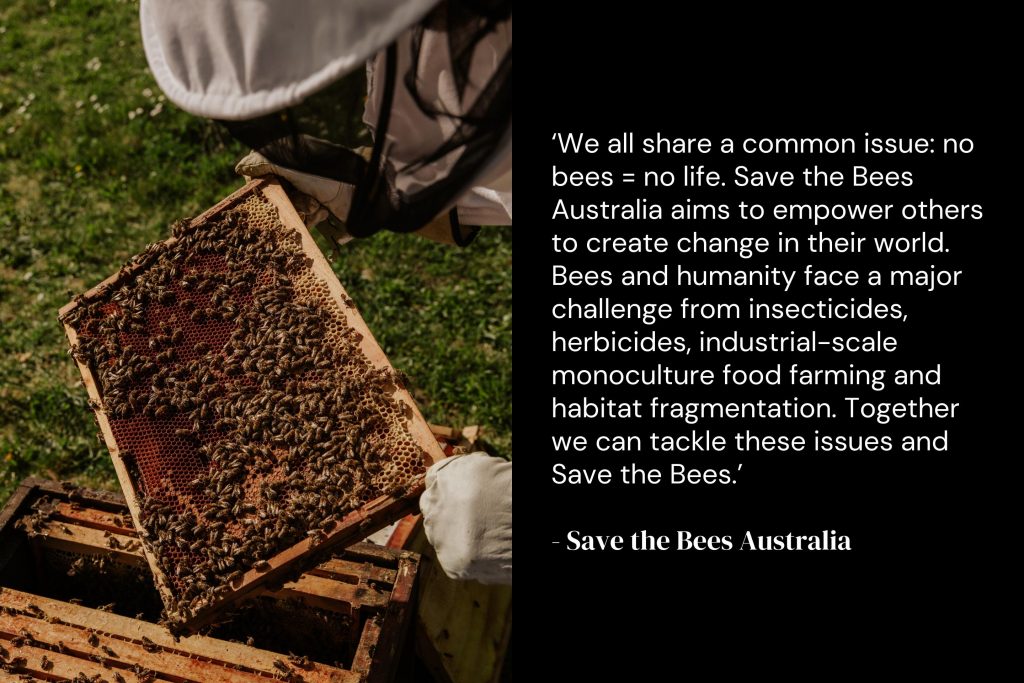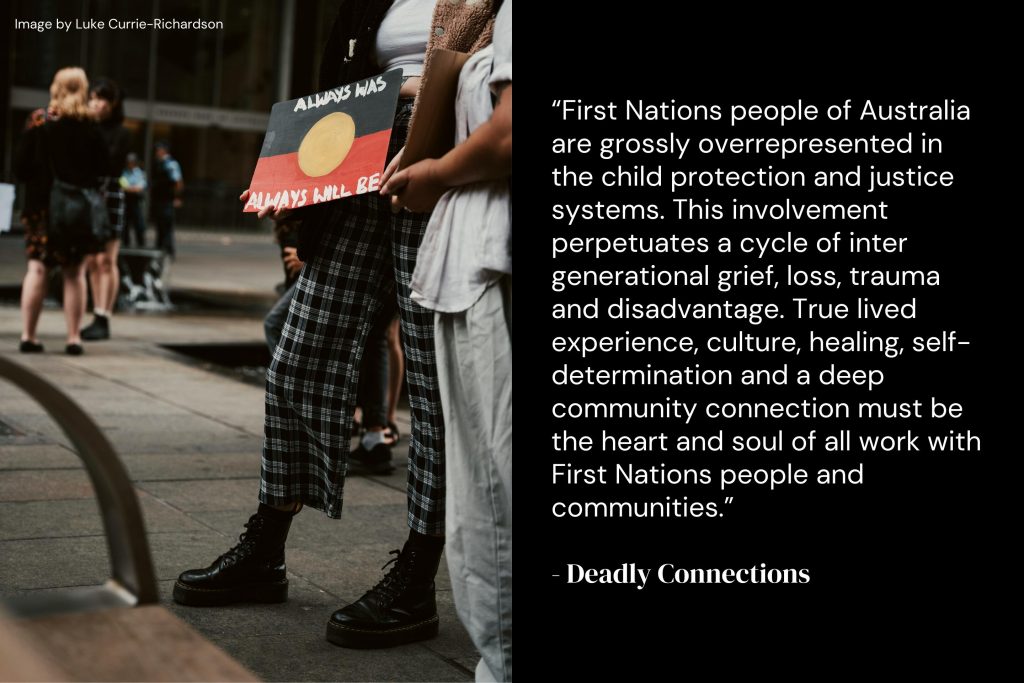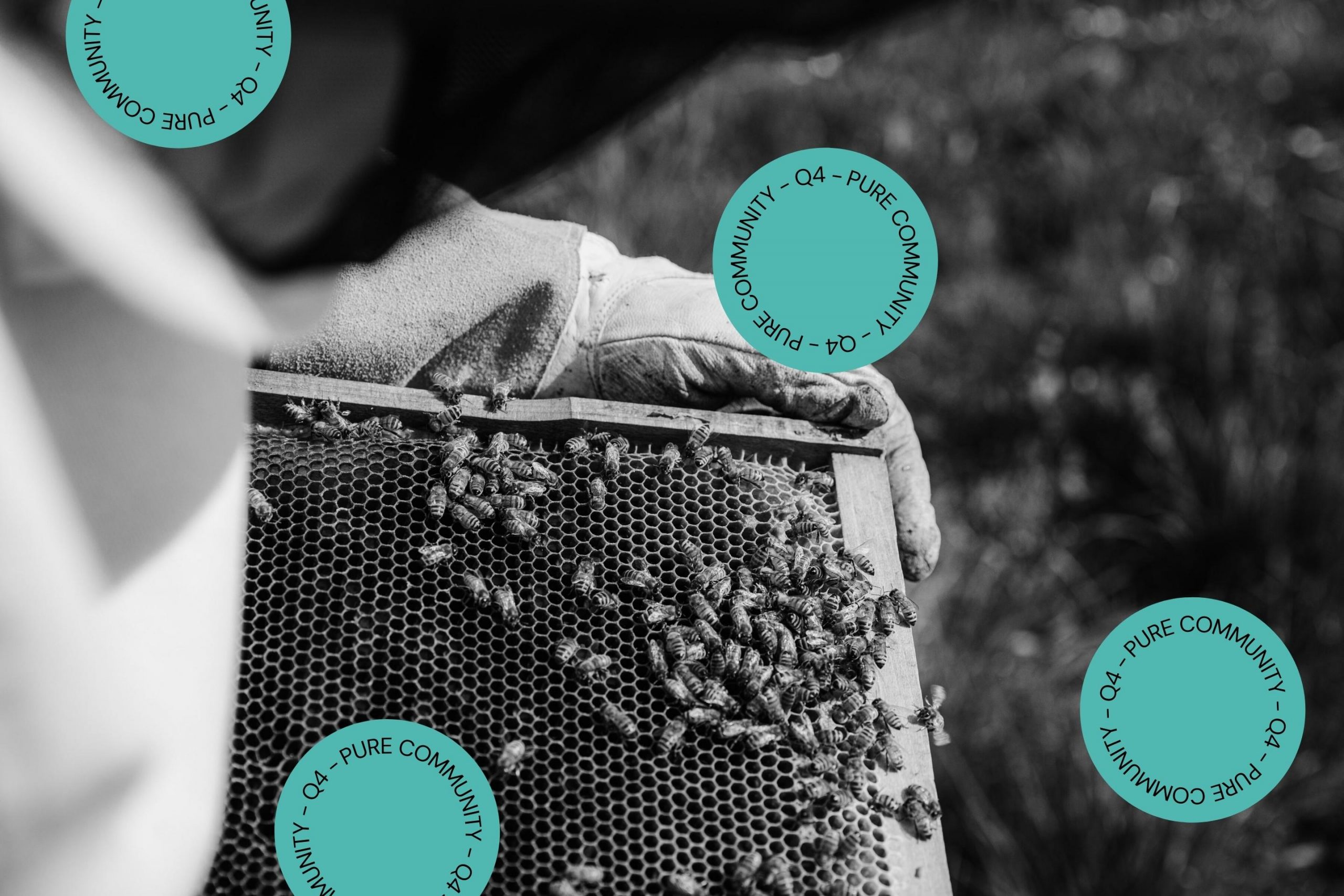*As an organisation, Pure Finance is committed to putting 5% of its revenue to work for good. Of that 5%, we designate 1% to supporting the planet through our partnership with 1% for the Planet, and another 1% goes toward Paying the Rent. The final 3% is set aside for the upcoming launch of a new not-for-profit - Yours.
While the new year hasn't exactly been the clean slate we were all hoping for, we are very much looking forward to continuing our commitment to putting finance to work for good in 2022. But before we do, let’s take a look at the amazing organisations that were on the receiving end of Pure Community’s final donations for the last quarter of 2021.
FOR THE PLANET - Save the Bees Australia
From news headlines to going viral on Tik Tok, it would seem that bees are having a moment. And, for good reason. As one of the most significant pollinator species in the world, bees are fundamental to maintaining widespread environmental health, as well as playing a crucial role in supporting our food systems and the planet as we know it. In Australia, over ⅔ of the food we eat relies on honeybee pollination, while our native bees (who don't generally produce honey) are essential to the survival of our native plants But, like so many of our precious and life-sustaining plant and animal species, bees are under threat like never before.
According to Save the bees Australia, this quarter’s ‘For the Planet’ donation recipient, “the state of beekeeping around the world is in calamity and close to a state of disaster.” Along with the usual suspects of climate change and the use of damaging insecticides and pesticides, global bee populations are suffering from a range of different threats, including:
Colony Collapse Disorder - when the majority of bees vacate their hive, leaving behind their queen, immature bees, and large honey supplies. This is an abnormal, but increasing occurrence and there is no clear understanding around why this occurs.
Varroa Mites - a parasite that enters the hive on the bodies of honeybees and feeds on, weakens, and kills colonies. These mites have reached every continent in the world except Australia and as a major exporter of bees, we’re in a unique position to help repopulate bee colonies globally with healthy bees.
Australian bee populations are also at risk from the widespread practice of monoculture farming, which leads to reduced biodiversity and soil degradation and increases the risk of bee populations being wiped out if the plant species being farmed encounters pest or disease, as well as honey tampering.

Things certainly aren't looking great for our bees, but thankfully, social enterprise Save the Bees Australia has been galvanising like-minded people to advocate for the bees since its inception in 2014. The community has been so effective in its advocacy that we have seen imported honey removed from Australian supermarket shelves and Bayers confidor neonicotinoids also removed from sale. In addition to their advocacy work, Save the Bees Australia are also heavily focussed on education, particularly in Kindergartens and schools, and their social media accounts and website are filled with educational info and tips to help us all become better allies for our honey making friends. They are also the creators of a fantastic free resource that connects consumers with local beekeepers, helping to support not only these small businesses, but also ensuring that honey lovers are only getting the good stuff.
For the final quarter of 2021, we were honoured to be able to donate $2,682.93 to Save the Bees Australia, and to play a small part in supporting their incredible work protecting one of the most important species for our continued survival on earth.
Want to become a bee protector yourself? Save the Bees have a range of suggestions for you to get involved and ‘Bee the Cure’:
- Support and encourage local beekeepers and small producers by buying local raw honey using the Save the bees Honey Map.
- Make your garden or balcony more bee friendly using these tips.
- Become a beekeeper (or find out if a hive can be managed on your property), or build a bee hotel in your neighbourhood.
- Care for local bees by growing herbs and letting them flower, provide drinking water, grow an insect friendly garden and learn to love weeds, and stop using toxic herbicides and neonicotinoid insecticides.
- Shop local, seasonal, and organic, when you can. Get to know the people behind your food and what practices your money goes to support. Farmers markets are an excellent way to source these foods, and support your local farmers and small businesses.
Plus, if you’d also like to donate to the cause and support the work of Save the Bees Australia, you can do so here.
PAYING THE RENT – Deadly Connections
As another January 26th rolls around we are again reminded that, for Australia’s First Nations people, this isn't a date for celebrating. For many, it’s a date that represents invasion, trauma and mourning and can be a painful reminder of the continuing impacts of colonisation on Aboriginal and Torres Strait islander people and culture in this country.
At the forefront of the conversation for increased justice is the call for Governments around Australia to ‘Raise the Age’ . That is, to raise the age at which Australian children can be arrested or locked up from (a very young) 10 to 14 years of age. Aboriginal and Torres Strait Islander children are disproportionately impacted by these laws and pushed into custody at even higher rates, accounting for 65 per cent of younger people in prisons. And, when we talk about Indigenous incarceration then we must too acknowledge the current endemic of deaths in custody.

A prominent voice in calling for Australia’s age of criminal responsibility to be raised is Deadly Connections, a community-led Sydney based not-for-profit that works to break the cycle of disadvantage and trauma and directly address the over-representation of Aboriginal people in the child protection and justice system(s). Deadly Connections’ primary aim is to improve mental health, reduce anti-social and risky behaviours to improve community safety, and crucially, to reduce the disproportionate rate of Aboriginal people coming into contact with the justice system. They do this by offering community centred, culturally responsive and holistic projects to develop stronger, safer communities for families, individuals and children. Some of these projects include:
Deadly Young Warriors is designed to empower jargums and young people to increase/maintain their self-confidence, develop their skills, capacity, and strengthen their cultural identity. The project adopts an early intervention, prevention, and diversion approach and is delivered through a range of community led, purpose-driven activities and mentoring, as well as specialised justice support and advocacy.
A semi-independent therapeutic program for people whose lives have been impacted by substance use, homelessness, child protection and justice systems, family breakdown and violence, providing a safe place for people to begin their individual healing journeys. Girra Girra has been developed by Aboriginal people for Aboriginal people and the program is staffed by people with lived experience, who have embarked on their own healing journeys.
The Deadly Futures program offers fun, creative, educational, and cultural activities for Aboriginal young people who have been suspended, or at risk of suspension or being disengaged from high school. It aims to strengthen Aboriginal young peoples connection to culture, improve school engagement, develop literacy/numeracy skills, disrupt the school to prison pipeline, provide mentoring, drug and alcohol information and education, and provide links to support for children and their families.
The purpose of the Bugmy Justice Project is to identify the unique systematic, racial, cultural, and historical factors specific to Aboriginal people who will be sentenced by NSW criminal courts. By reducing information asymmetries this project seeks to improve the sentencing processes and outcomes for defendants by providing courts with additional information that addresses the personal and community circumstances of the individual Aboriginal person and relevant sentencing options. At present, Aboriginal people are disempowered by Sentence Assessment Reports (SAR) that provide a narrow snapshot and risk assessment of the individual, while current risk assessment tools are shown to be inaccurate and potentially culturally biased against Aboriginal people.
‘Our programs work at the heart of the community and are driven from our own cultural beliefs and traditions so we can break the cycle at key life stages where disadvantage and trauma emerge. They are innovative programs based on lived experience and personal skills that create change.’ - Deadly Connections
For this quarter, we were honoured to give $2,683 to Deadly Connections, to support their vital work in helping break the cycles of disadvantage, trauma, child protection and justice involvement so that Australia’s First Nations people can thrive and not just survive.
This #survivalday why not lend your support by donating to Deadly Connections here, and while you’re at it, you can also:
- Sign the Raise the Age petition and write to your local MP
- Write a letter or card to someone in custody
- Shop for Deadly Connections merchandise
- And spread the word!
On behalf of all of us at Pure Finance, we want to say a big thank you to all of the people working hard to make our world a more just and equitable one. It is an honour to be able to support your work in ways both big and small.
If you want to know more about our profit for purpose model, or want to find out more about Pure Community, visit: www.purecommunity.co or get in touch with us.
*Pure Community and Pure Finance have no direct affiliation with the organisations and causes listed above, we simply appreciate the work that they do, and choose to show our appreciation by donating to them.
